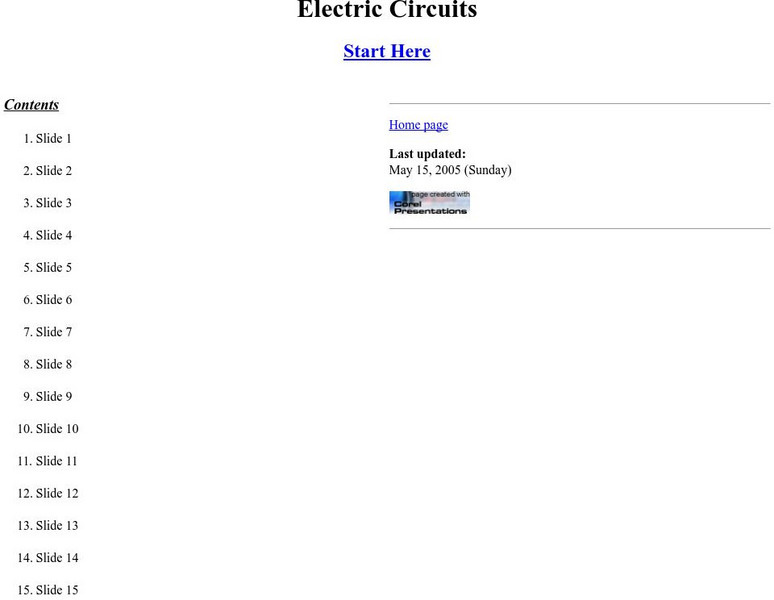Mascil Project
Design and Build Your Own Vacuum Cleaner, Hair Dryer or Toy Car
No vacuum cleaner? No problem, just build your own. Scholars apply knowledge of currents to build a model of either a vacuum clear, a hair dryer, or a toy car. While the class completes the activity, instructors consider gender...
CK-12 Foundation
Electric Analogies
We can see the result of electricity but not the process itself. The simulation compares electric circuits to a water tower and water wheel cycle. Young scientists adjust the height of the tower, the amount of resistance, and if...
Teach Engineering
Can You Resist This?
Some things are hard to resist. Small collaborative groups build circuits and calculate the voltage using Ohm's Law. Budding engineers explore the connection between the voltage across different resistors and linear...
Teach Engineering
Introduction to Circuits and Ohm's Law
Take a very basic understanding of circuits and develop a strong understanding of the parts and function of a circuit. This activity is developed to be an independent exploration of circuits from the basics to series and parallel models....
Curated OER
Typical Numeric Questions for Physics I - Electric Circuits
A collection of 15 practice problems, most of them involving circuit schematics, is provided for your physics class on this handout. Learners are to compute the net charge, resistance, energy, or power dissipated for different...
Curated OER
Physics 152 Fall 2004 Final Exam, Parts A, B, C, D
At the end of a general physics course focused on light and electricity, you can administer this exam. Concepts covered include electromagnetism, circuits, induction, light rays, lenses and mirrors, characteristics of light, electron...
Curated OER
Circuit Math
Seven circuits are spread over three pages. One is a parallel circuit, one is a series circuit, and the rest are combinations. Emergent electrical engineers solve for current, voltage, or resistance. They fill in a chart for each...
Curated OER
Series and Parallel Circuits
Electricians draw four different circuits and answer questions about the resistance, voltage drop, and current at different points in each. Completing this activity will help make sure that your class is understanding what is happening...
Curated OER
Experience the 5E Instructional Model with Electrical Circuits
Students build electrical circuits. In this instructional activity teaching pre-service teachers how to use the 5E instructional model, students use materials to explore how to create an electrical circuit.
Curated OER
Build Your Own Simple DC Motor
Students, after brainstorming how we interact with some kind of motor every day in our lives, explore how to build their own DC motor. They collect all the parts needed for their experiment and review all safety precautions. In addition,...
Curated OER
WHAT MAKES A LIGHT BULB LIGHT?
Students are able to use inquiry to answer the essential questions. They are able to predict and test configurations of a battery, bulb, and wire that make the complete circuit. Students craft a group and individual theory of a...
Curated OER
Parallel Circuits
Students investigate the way an electrical circuit works. In this physics lesson, students use voltmeters and ammeters to measure voltage. They construct a circuit using provided circuit kits.
Curated OER
What is Electrical Energy?
In this electrical energy worksheet, students write in 3 causes and effects of electrical energy. This worksheet is a graphic organizer.
Curated OER
How a Circuit Works
Young scholars discover the basic principles of circuits by designing and testing some of their own. They are told that circuits usually have a power source such as a battery and a resistor such as a light. Students make a circuit using...
Physics Classroom
The Physics Classroom: What Is an Electric Circuit?
In this tutorial the concept of electric potential difference is discussed. Electric potential is the amount of electric potential energy per unit of charge that would be possessed by a charged object if placed within an electric field...
Physics Classroom
The Physics Classroom: Common Misconceptions Regarding Electric Circuits
In this tutorial, preconceived ideas regarding the nature of charge flow and the role of a battery in a circuit are addressed. In many instances, these preconceived notions about charge flow and batteries are incorrect ideas and are...
Physics Classroom
The Physics Classroom: Journey of a Typical Electron
In the wires of electric circuits, an electron is the actual charge carrier. In this article, an electron's path through the external circuit is introduced.
Physics Classroom
The Physics Classroom: Current Electricity: Electrical Resistance: Ohm's Law
There are certain formulas in physics that are so powerful and so pervasive that they reach the state of popular knowledge. The predominant equation which pervades the study of electric circuits is often referred to as the Ohm's law...
CK-12 Foundation
Ck 12: Fourth Grade Science: Physical Science: Electric Circuits
[Free Registration/Login may be required to access all resource tools.] Describes the parts of an electric circuit and identifies electric safety features and how to use electricity safely.
Upper Canada District School Board
Tom Stretton's Chemistry Pages: Electric Circuits
Learn the voltage formula for determining a measure of current electricity in this illustrated presentation.

















